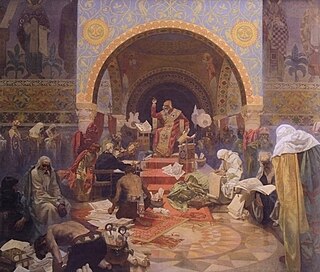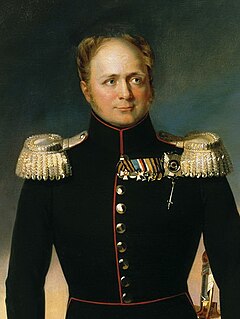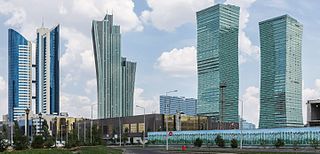
Nur-Sultan, called Astana until March 2019, is the capital city of Kazakhstan. It stands on the banks of the Ishim River in the northern portion of Kazakhstan, within the Akmola Region, though administered separately from the region as a city with special status. A 2017 official estimate reported a population of 1,029,556 within the city limits, making it the second-largest city in Kazakhstan, behind Almaty, the capital from 1991 to 1997.
Alexandrovsky District is the name of several administrative and municipal districts in Russia. The district names are generally derived from or related to the male first name Alexander.

Kassym-Jomart Kemelyevich Tokayev is a Kazakh politician and diplomat. He took office as the President of Kazakhstan on 20 March 2019, succeeding Nursultan Nazarbayev, who resigned on 19 March 2019 after 29 years in office. Tokayev was elected president of Kazakhstan in an early election on 9 June 2019 with 71% of the popular vote. According to the OSCE, "significant irregularities were observed on election day, including cases of ballot box stuffing, and a disregard of counting procedures meant that an honest count could not be guaranteed." "There were widespread detentions of peaceful protesters on election day in major cities", said the OSCE in their Statement of Preliminary Findings and Conclusions.

Abdullah Khan (1533/4–1598), known as "The old Khan", was an Uzbek ruler of the Khanate of Bukhara (1500–1785). He was the last Shaybanid Dynasty Khan of Bukhara, from 1583 until his death.
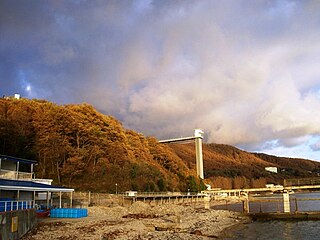
Tuapse is a town in Krasnodar Krai, Russia, situated on the northeast shore of the Black Sea, south of Gelendzhik and north of Sochi. Population: 63,292 (2010 Census); 64,238 (2002 Census); 63,081 (1989 Census).

The Nakhchivan Khanate was a khanate that was established in Afsharid Persia in 1747. The territory of the khanate corresponded to most of the present-day Nakhchivan Autonomous Republic and Vayots Dzor Province of present-day Armenia. It was named after its chief settlement, the town of Nakhchivan.
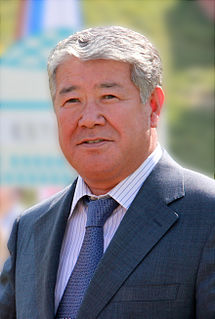
Akhmetzhan Yessimov is the former Mayor of Almaty and director of EXPO-2017.

A zhuz is one of the three main territorial and tribal divisions in the Kypchak Plain area that covers much of the contemporary Kazakhstan, and represents the main tribal division within the ethnic group of the Kazakhs.

Grachyovsky District is the name of several administrative and municipal districts in Russia.

Shamkhalate of Tarki was a feudal domain in north-eastern part of Dagestan with its center in Tarki.

Kurganinsky District is an administrative district (raion), one of the thirty-eight in Krasnodar Krai, Russia. As a municipal division, it is incorporated as Kurganinsky Municipal District. It is located in the east of the krai. The area of the district is 1,590 square kilometers (610 sq mi). Its administrative center is the town of Kurganinsk.
Junior Kabananga Kalonji is a Congolese international footballer who plays for Qatar, as a striker.

Kandyagash is a town and the administrative center of Mugalzhar District in Aktobe Region of western Kazakhstan. Population: 29,169 ; 25,553.
Fatali Khan of Quba or Fath Ali-Khan of Quba – was a khan of the Quba Khanate (1758–1789).

Vitebsk Governorate was an administrative unit (guberniya) of the Russian Empire, with the seat of governorship in Vitebsk. It was established in 1802 by splitting the Byelorussia Governorate and existed until 1924. Today most of the area belongs to Belarus, the northwestern part to Latvia and the northeastern part to Pskov and Smolensk Oblasts of Russia.
Caucasus Governorate was an administrative division of the Russian Empire, which existed from 1802 until 1822. Its seat was located in Georgiyevsk. The governorate was located in the south of the European part of the Russian Empire. In 1822, the governorate was abolished and transformed into Caucasus Oblast, with the administrative center in Stavropol. In terms of modern administrative divisions of Russia, the area of Caucasus Governorate is currently split between Stavropol and Krasnodar Krais, Rostov Oblast, and the Republics of Kabardino-Balkaria, North Ossetia–Alania, Ingushetia, Chechnya, Dagestan, and Kalmykia, with the major part of it being located in Stavropol Krai.

Tver Governorate was an administrative division of the Russian Empire and Russian SFSR, which existed from 1796 until 1929. Its seat was in Tver. The governorate was located in the center of the European part of the Russian Empire and bordered Novgorod Governorate in the north, Yaroslavl Governorate in the east, Vladimir Governorate in the southeast, Moscow Governorate in the south, Smolensk Governorate in the southwest, and Pskov Governorate in the west.
Syrym Datuly Batyr (1712—1802) was the Sergeant Major of the Kazakh clan Bayuly, the leader of the national anti-feudal and anti-colonial movements of the Kazakhs of the Little Horde in the years 1783-1797. Syrym Datuly took part in the Pugachev's Rebellion of 1773-75. Preserved report to Count Alexander Suvorov P.I. Panin on June 22, 1775, in which he reports S. Datuly as one of the most active participants in the uprising. In any case, the excitement of the Kazakhs were a direct continuation of the events.
Dinara Rakhimbaeva – is a Kazakh photomodel and blogger.

